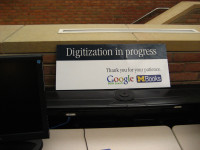The need for a large-scale Canadian digitization strategy has been readily apparent for many years, with experts repeatedly pointing to the benefits that would come from improved access to Canadian history and culture. While other countries have marched ahead with ambitious projects that often incorporate historical text records, photographs, and video, Canada has fallen behind.
Library and Archives Canada, which is charged with preserving and making accessible Canada’s documentary heritage, has led the digitization effort, but most of its work over the past decade has failed to bear much fruit.
Given the past disappointments, my weekly technology law column (Toronto Star version, homepage version) notes the launch a massive new digitization project should have been a cause for celebration. Last June, the LAC and Canadiana, an alliance of public and academic libraries focused on digital preservation, announced plans to digitize and create metadata on 60 million historical Canadian documents. The documents are currently in microfiche and the project envisions digitizing the images and adding transcriptions and metadata (data about data content) to improve their searchability.
Yet as the details of the project dubbed Héritage leaked out, controversy arose with concerns that the historical documents would be placed behind a paywall that would require individual Canadians to pay monthly fees for access. That generated a significant outcry from many groups, with then-Canadian Heritage Minister James Moore assuring the House of Commons that the new head of LAC would closely examine the project.
After the outcry subsided, however, H̩ritage began to proceed largely as planned. The key supporters of the project РCanadiana, the major library associations, and the LAC Рtried to assure critics that their concerns were unfounded, promising to make the digitized microfiche copies freely available to all and restricting additional fees to value-added services such as transcription or metadata. However, newly obtained documents under the Access to Information Act raise troubling questions about public access and promises of exclusivity made by the LAC.
Read more ›








